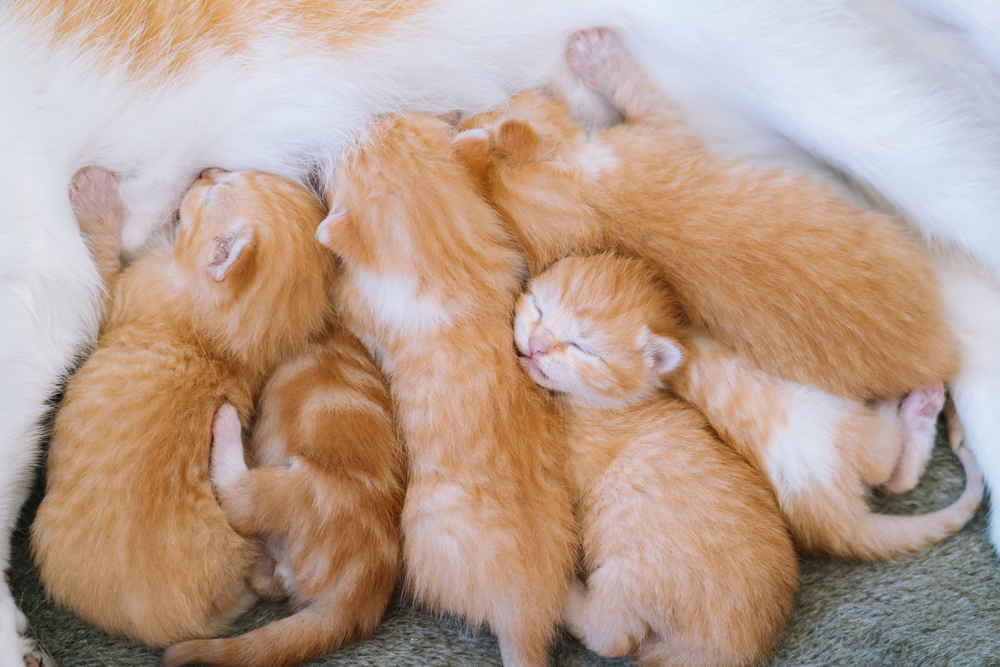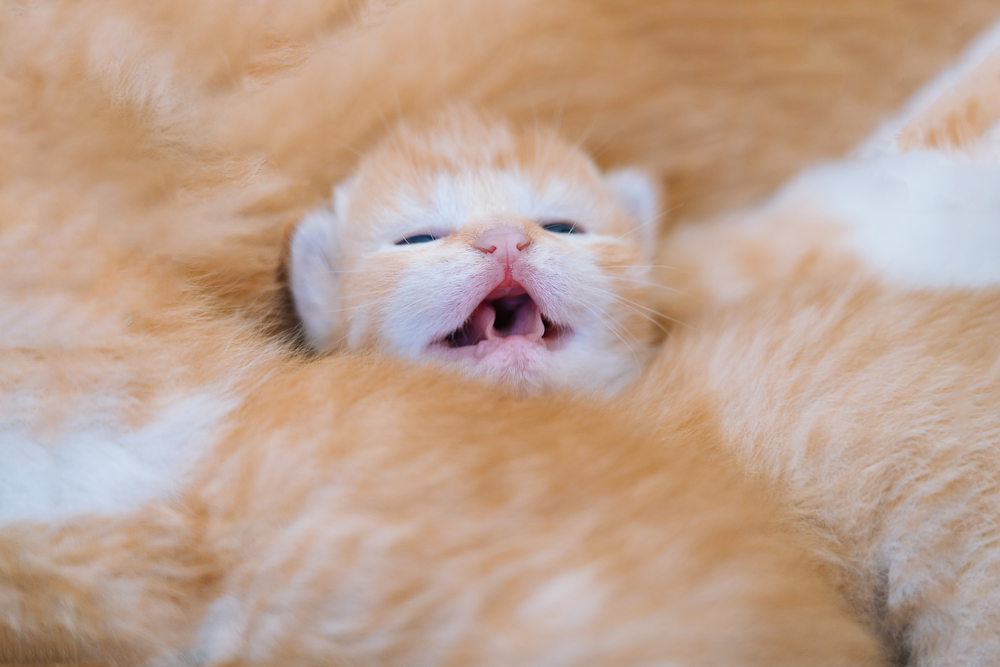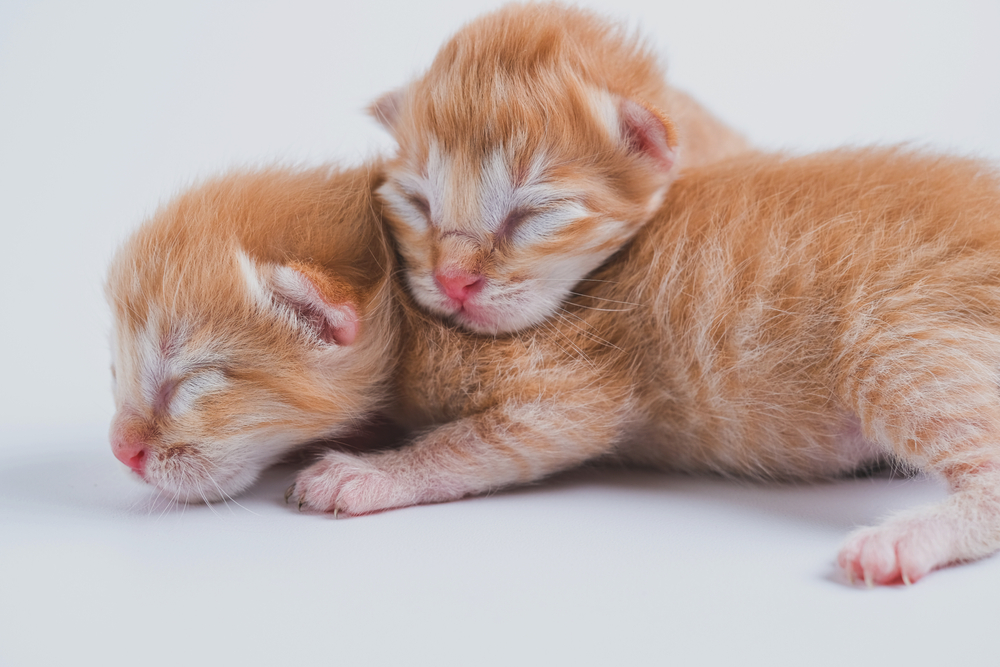First of all, we want to say, “Congratulations on your furry new arrivals!” The first time they open their giant eyes, you'll feel like the best cat parent in the world. Whether your cat’s litter was planned or a happy accident, there’s no denying that welcoming newborn kittens into the world is exciting. But kitten care can also be a lot of work.
Caring for kittens isn't for the faint of heart, between learning how to feed them and how to help them potty, you'll be in the thick of things. Thankfully, we have some good news: You can take care of your newborn kittens without it becoming a second job. Here’s what you need to know.

How to care for newborn kittens
Did you know that a kitten is actually considered a newborn until they're 4 months old? By that point, they are old enough to be completely weaned off their mother’s milk, learn how to socialize with their littermates, and hit important developmental milestones.
So, how do you care for these tiny, helpless kittens in the meantime? We’re here to help you out. Let’s take a look at what the experts say.
Step 1: Handle the kittens as infrequently as possible.
If all goes well during the birthing process, Mama Cat will take on the bulk of kitten care. Vets recommend only touching kittens in a few circumstances until their eyes are open, which happens at about 10 days old.
Step 2: Let your cat set the pace.
Just as human mothers have strong maternal instincts, so do feline mothers. While formula is useful and convenient, nothing is better for kittens than their mother’s milk, which provides all the essential nutrients they need to grow healthy and strong. However, some mothers are unable to produce enough milk, and others even neglect their newborns.
If that’s the case, you’ll want to bottle-feed your kittens and help them eliminate waste and urine every 3 hours. (And if the kittens are especially tiny, you’ll need to do this every 2 hours.)
Step 3: Make sure the kittens stay warm.
Not only are kittens born deaf and blind, but they’re also born without the ability to regulate their temperature. Provide clean, warm bedding for Mama Cat and her babies, and don’t let your furry family sleep in a drafty room.
You should keep the kittens in an extremely warm room — 85 to 90 degrees Fahrenheit Fahrenheit is ideal. (If you don’t have central heating and air, pet-safe space heaters and heating pads may be your best bet.)

How long can newborn kittens go without eating?
Newborn kittens are completely reliant on their mother (or you). She nurses them, bathes them, keeps them warm, and comforts them when they’re frightened. In an ideal world, no kitten would ever be separated from their mother before they're ready. Unfortunately, tragedies happen. If you find an abandoned litter or your kittens are unable to nurse from their mother for any reason, they’ll only survive around 12 hours without food.
Older babies may live as many as four days without nursing, but time is of the essence. If you suspect your kittens aren’t eating enough — or fear they may have stopped eating — it’s time for a trip to the vet. Delaying veterinary treatment could have heartbreaking consequences.

How to feed newborn kittens in an emergency
Unfortunately, some mother cats refuse to nurse their kittens, while others may experience health problems that cause their milk to dry up ahead of schedule, leading to dehydration, malnourishment, and even death if you can’t supplement the kittens’ diet — and fast.
Kitten formula is the next best thing, but what happens if you can’t find any? Not everyone lives in an area with 24/7 supermarkets, and with supply chain issues growing even more common, there’s no guarantee that a new shipment of kitten formula will grace your local store’s shelves anytime soon. One option, you can double the strength of any brand of baby formula and use that.
In case of an emergency, we’ve found one of the easiest kitten formula recipes you can make with ingredients you most likely already have in your kitchen.
DIY emergency kitten formula recipe
While vets say a combination of one egg yolk, unflavored gelatin, whole goat’s milk, Karo syrup, and goat’s milk yogurt is the preferred emergency formula, let’s be honest. Do you even know where to buy goat’s milk and goat’s milk yogurt? Because we sure don’t. Fortunately, there’s an easier recipe you can follow. You’ll need:
- 1 teaspoon vegetable oil
- 2 egg yolks
- 8 ounces whole milk (homogenized only)
You’ll want to warm the mixture just as you would store-bought kitten formula, and you can store the leftovers in the fridge. If you have liquid pediatric vitamins on hand, adding a dropperful will provide additional nutrients.
Is there anything more adorable than a litter of newborn kittens? Nope. But newborn kittens, like all newborns, require a ton of work. Luckily, there are a few things you can do to make the process easier. If you plan ahead, allow your cat to care for her kittens, and seek veterinary assistance when you need it, caring for your new kittens will be a joy rather than a hassle.
Editors' Recommendations
- Wondering why cats chirp? Fascinating reasons why your cat chirps at birds (and you)
- How to cat-proof your balcony before the unthinkable happens
- When do kittens start eating food? Know the facts for your fur baby’s health
- When do kittens’ eyes change colors? The answer is so cool – here’s what to know
- How to keep stray cats out of your yard respectfully and humanely




